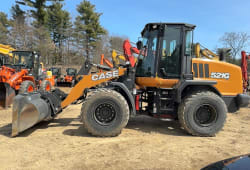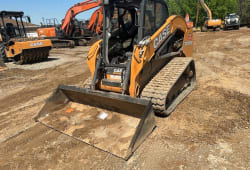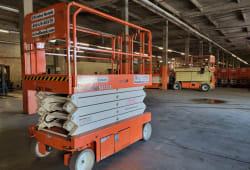Wheel Loaders: Powerhouses of Material Handling
9 Lectura mínima
)
diciembre 23, 2023
Wheel loaders, also known as front-end loaders or bucket loaders, are robust and versatile construction machines designed for handling a wide range of materials. These heavy-duty vehicles play a pivotal role in various industries, from construction and mining to agriculture and forestry. This comprehensive exploration delves into the intricacies of wheel loaders, covering their design, functionalities, applications, and the latest advancements in technology. As essential tools in the modern industrial landscape, wheel loaders contribute significantly to efficiency and productivity, showcasing their adaptability in diverse settings. This exploration aims to unravel the nuanced features that make wheel loaders indispensable assets in the ever-evolving world of heavy machinery.
Evolution of Wheel Loaders
Historical Overview
The evolution of wheel loaders can be traced back to the early to mid-20th century when the need for efficient material handling in construction projects became evident. The first wheel loaders were rudimentary compared to their modern counterparts, featuring basic functionalities and limited capacity. Over the decades, advancements in technology and engineering have transformed wheel loaders into versatile, powerful machines, integral to a wide range of industries for their exceptional loading and handling capabilities.
Technological Advancements
Over the decades, technological advancements have transformed wheel loaders into sophisticated machines. Hydraulic systems, improved transmission, and ergonomic designs have significantly enhanced their efficiency, making them indispensable in various industries. These innovations represent a leap forward, showcasing the relentless pursuit of excellence in engineering that defines the modern era of construction equipment.
Anatomy of Wheel Loaders
Frame and Chassis
The frame and chassis serve as the backbone of a wheel loader, providing structural integrity and support for various components. Modern designs prioritize durability, often using high-strength steel alloys. The frame's robust construction ensures stability, while the chassis plays a pivotal role in distributing loads and enhancing overall performance, making them integral elements in the efficient functioning of wheel loaders.
Powertrain
Wheel loaders are indispensable in construction and mining, boasting diesel engines renowned for their robustness and load-handling capabilities. The continual enhancements in engine efficiency not only ensure optimal performance but also contribute to lower fuel consumption and emissions. The powertrain, a critical component, plays a pivotal role in propelling these heavy-duty machines with reliability and power, further elevating their efficiency and versatility.
Hydraulic System
The loader's seamless functionality relies on a sophisticated combination of mechanical and electronic systems. The hydraulic system is a crucial component, responsible for powering the loader's movements and enabling the efficient operation of attachments. Innovations in hydraulics have led to smoother and more precise control, enhancing the overall performance and productivity of these versatile machines in various applications.
Loader Arms and Buckets
Loader arms and buckets play a pivotal role in material handling. Engineered for robust strength and flexibility, loader arms facilitate efficient lifting and dumping. Complementing them, diverse bucket types are tailored to handle specific materials and applications, ensuring optimal performance in various scenarios. Together, these components form a cohesive system, enhancing the overall functionality of loaders in a range of industries.
Tires and Suspension
Wheel loaders depend on robust tires and suspension systems for versatile terrain navigation. Tires and suspension play pivotal roles in enhancing stability, traction, and operator comfort. Ongoing innovations in tire technology and suspension design continue to elevate performance, ensuring these heavy-duty machines excel in diverse environments while prioritizing the safety and well-being of operators.
Functionality and Applications
Material Handling
Wheel loaders excel in material handling, demonstrating remarkable versatility in loading, transporting, and unloading diverse materials like gravel, sand, rocks, and debris. Their efficiency and precision make them indispensable for a range of applications, showcasing their pivotal role in streamlining tasks related to Material Handling. These robust machines continue to play a crucial part in optimizing operations across construction sites and other industrial settings.
Construction Industry
In the dynamic realm of construction, wheel loaders play a pivotal role in crucial tasks like excavation, site preparation, and transporting construction materials. In the construction industry, their versatility shines as they effortlessly navigate tight spaces and efficiently handle heavy loads, making them indispensable assets on sites of all sizes.
Mining Operations
In mining, wheel loaders play a vital role in moving large volumes of earth and ore. Their robust design and high payload capacity make them well-suited for the demanding conditions of mining operations. These powerful machines efficiently handle materials, contributing to the success of mining projects by enhancing productivity and streamlining the extraction process.
Agriculture and Forestry
Wheel loaders play a pivotal role in various industries. In construction, they excel at moving heavy materials, while in agriculture and forestry, their versatility shines. Agriculture benefits from wheel loaders handling bulk materials, loading feed, and clearing debris. In forestry, these robust machines navigate challenging terrain, efficiently transporting logs and materials. Their adaptability makes wheel loaders indispensable in enhancing productivity across diverse sectors.
Waste Management
Wheel loaders play a pivotal role in waste management, efficiently moving and loading materials at landfill sites. These versatile machines, equipped with attachments like grapples and forks, enhance their capabilities in handling various types of waste. Their robust design and functionality contribute significantly to streamlining waste disposal processes, making wheel loaders indispensable in the realm of Waste Management.
Advancements in Technology
Automation and Telematics
The integration of automation and telematics has brought about a paradigm shift in wheel loader technology. Automated features, such as GPS-guided operation and remote monitoring, enhance efficiency and safety. Automation streamlines tasks, while telematics provides real-time data, optimizing performance and facilitating proactive maintenance. Together, they redefine the landscape of heavy equipment operation, delivering precision and connectivity for modern construction and industrial applications.
Electric and Hybrid Models
The push for sustainability has led to the development of electric and hybrid wheel loaders. These eco-friendly alternatives aim to reduce carbon emissions and energy consumption while maintaining the performance expected from traditional diesel-powered loaders. Electric and hybrid models represent a significant stride towards a greener future in construction and heavy machinery industries.
Advanced Operator Interfaces
Modern wheel loaders are equipped with advanced operator interfaces, including touchscreen displays and ergonomic controls. These features enhance operator comfort, reduce fatigue, and improve overall productivity. The incorporation of Advanced Operator Interfaces further refines the user experience, providing intuitive and efficient control options, ultimately contributing to a smoother and more streamlined operation of the wheel loader.
Maintenance and Safety Considerations
Regular Maintenance Practices
Proactive maintenance is crucial for ensuring the longevity and optimal performance of wheel loaders. Regular checks on engine health, hydraulic systems, and tires are essential to prevent unexpected breakdowns. Incorporating regular maintenance practices into the routine not only enhances reliability but also minimizes downtime, ensuring that wheel loaders operate efficiently, ultimately contributing to increased productivity and cost-effectiveness in various industrial applications.
Operator Training and Safety
Efficient use of wheel loaders hinges on operator training and safety. Operator training is paramount to ensure the safe and efficient use of wheel loaders. Training programs cover proper operating procedures, safety protocols, and maintenance practices, reducing the risk of accidents and equipment damage. Prioritizing operator training fosters a secure working environment and maximizes the lifespan of machinery, ensuring optimal performance and productivity in various industrial settings.
Safety Features
Modern wheel loaders are indispensable in construction, boasting powerful performance and versatility. These machines efficiently handle various tasks, from loading materials to transporting heavy loads. Safety features like cameras, sensors, and alarms enhance visibility, alerting operators to potential hazards. These advancements significantly reduce the risk of accidents, making wheel loaders a reliable and secure choice for demanding job sites.
Challenges and Future Outlook
Environmental Concerns
Advancements in electric and hybrid models are making strides in addressing environmental concerns within the automotive sector. However, the heavy machinery industry faces challenges related to emissions and resource consumption. Ongoing research and development play a crucial role in finding sustainable solutions, ensuring a balance between technological progress and environmental preservation.
Integration with Emerging Technologies
The seamless integration of wheel loaders with emerging technologies, such as artificial intelligence and machine learning, holds great promise for enhancing efficiency and automation in construction and industrial settings. This integration opens avenues for predictive maintenance and smart operational capabilities, making substantial contributions to overall performance and resource management. Embracing these advancements ensures a future-ready approach to heavy machinery operations.
Global Market Trends
The construction industry is experiencing a transformative shift with wheel loaders incorporating cutting-edge technologies like artificial intelligence and machine learning. This integration promises enhanced efficiency and automation. Global Market Trends indicate a growing reliance on predictive maintenance and smart operational capabilities, underscoring the potential for significant advancements in the sector's productivity and sustainability.
Conclusion
Wheel loaders stand as indispensable workhorses in industries that rely on efficient material handling. From their humble beginnings to the technologically advanced machines of today, wheel loaders continue to evolve, adapting to the changing needs of diverse sectors. With ongoing research and innovation, the future holds exciting possibilities for further enhancing the capabilities, efficiency, and sustainability of these powerful machines. In conclusion, wheel loaders play a crucial role and will likely remain essential in shaping the future of material handling.

Caleb Woods is an experienced content specialist and an editor at Boom & Bucket, blending his journalism background with expertise in the heavy equipment industry. He delivers engaging, informative content to help professionals stay informed and make smarter decisions in the machinery market.











